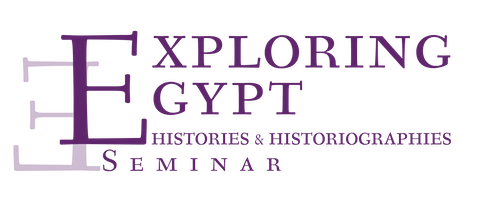Manifestations scientifiques
Abonnez-vous à la … Subscribe to the Mailing list :

Exploring Egypt Seminar: Histories and Historiographies
Le dimanche 21 janvier 2024 à 17h00 (heure du Caire), DAIK 
The Enemy of my Enemy is my Friend:
Exploring the Mamluk Dynasty (1250-1517) through Popular Culture
Yasmine Moataz Ahmed & Claire Panetta
Langue : anglais.
The 3rd session of the seminar series 'Exploring Egypt: Histories and Historiographies', a joint initiative of the Ifao & the German Archaeological Institute in Cairo (DAIK) organized by Fatma Keshk & Malak Labib, features Yasmine Moataz & Claire Panetta. The session is open to public and will be held in the DAI Kairo at Zamalek, Sunday January 21st at 5 p.m.
Abstract:
This presentation queries a wave of popular interest in the legacy of the Mamluk dynasty (1250-1517) in post-2013 Egypt. Despite their non-Muslim and non-Arab backgrounds, the Mamluks have recently been described as architects of the “golden age” of Islam and the last “domestic” rulers before the arrival of the Ottomans. This revised characterization underpins a longstanding fascination with their legacy, which can be seen in various forms of popular culture. In this presentation, we narrow in on one manifestation of this interest: a recent television series called Mamalik al-Nar (Kingdoms of Fire). We consider the show’s content, its popularity in Egypt, the debates it has generated on social media and the regional production and distribution networks in which it is embedded. Through this analysis, we argue that the series – and the interest in the Mamluks to which it is connected – reflects geopolitical tensions and anxieties and is part of an unresolved debate about what it means to be “Egyptian.”
Key words: Mamluk dynasty, Egyptian nationalism, historicity, geopolitics, popular culture
|
|
Yasmine Moataz Ahmed is an Assistant Professor of Anthropology and Sociology, Department of Sociology, Egyptology and Anthropology (SEA) at the American University in Cairo and a Research Associate at the Centre d’études et de documentation économiques, juridiques et sociales (CEDEJ). She is currently working on a book titled Moving through Tangles: Farmers, Politics and the ‘State’ in a Changing Egypt (forthcoming with Cambridge University Press). It is a critical ethnography of collective rural politics in the village of al-Ab`adiyya Wālī Mizār in Fayyūm between August 2011 until 2017. Her work has appeared in Anthropology News, the Review of African Political Economy, the Journal of Peasant Studies, the Canadian Journal of Development Studies and the Middle East Journal of Culture and Communication. She received her PhD in social anthropology from the University of Cambridge. |
|
|
Claire Panetta is Term Assistant Professor of Urban Studies at Barnard College in New York. She is an urban anthropologist whose research explores the political valences of urban development and architectural heritage in Cairo. She is currently working on a book, The City as Politics: Sociospatial Change and Political Indeterminacy in Post-Revolution Cairo, that analyzes urban transformations in the city after the January 25th Revolution of 2011. Her work has been published in the Middle East Journal of Culture and Communication, International Journal of Heritage Studies, the Wiley-Blackwell Encyclopedia of Urban and Regional Studies and the Routledge Handbook of Urban Design Research Methods. She received her PhD in cultural anthropology from the Graduate Center of the City University of New York. |

Exploring Egypt Seminar: Histories and Historiographies
A joint collaboration between the Institut français d’archéologie orientale (ifao) & the German Archaeological Institute in Cairo (DAIK), this seminar series aims, broadly speaking, to discuss different aspects related to the production of historical knowledge on Egypt. Speakers are invited to reflect on the different ways of writing, narrating and thinking about Egypt’s history at different periods, as well as on the actors, contexts, and power relations involved in the production of historical narratives. By adopting an interdisciplinary perspective, the seminar series seeks to bring into conversation fields which have traditionally been examined separately, such as the history of Egyptology, the study of modern Egyptian historiography, and the history of heritage and preservation.
In addition, while the seminar series seeks to shed a critical light on the formation of specific disciplinary fields and traditions, it also moves beyond an exclusive focus on professional history writing, in order to explore the various institutions, genres, and channels, through which historical narratives have been produced and disseminated. Among the themes that will be discussed, for instance, are the different “histories” of Egyptology, archaeology or Arabic and Islamic studies, academic versus “popular” representations of history, and heritage preservation as a site of production of historical narratives.
Exploring Egypt: Histories and Historiographies Seminar is organised by Fatma Keshk, Postdoctoral fellow at DAIK & Ifao and Malak Labib, scientific member of the Ifao.



